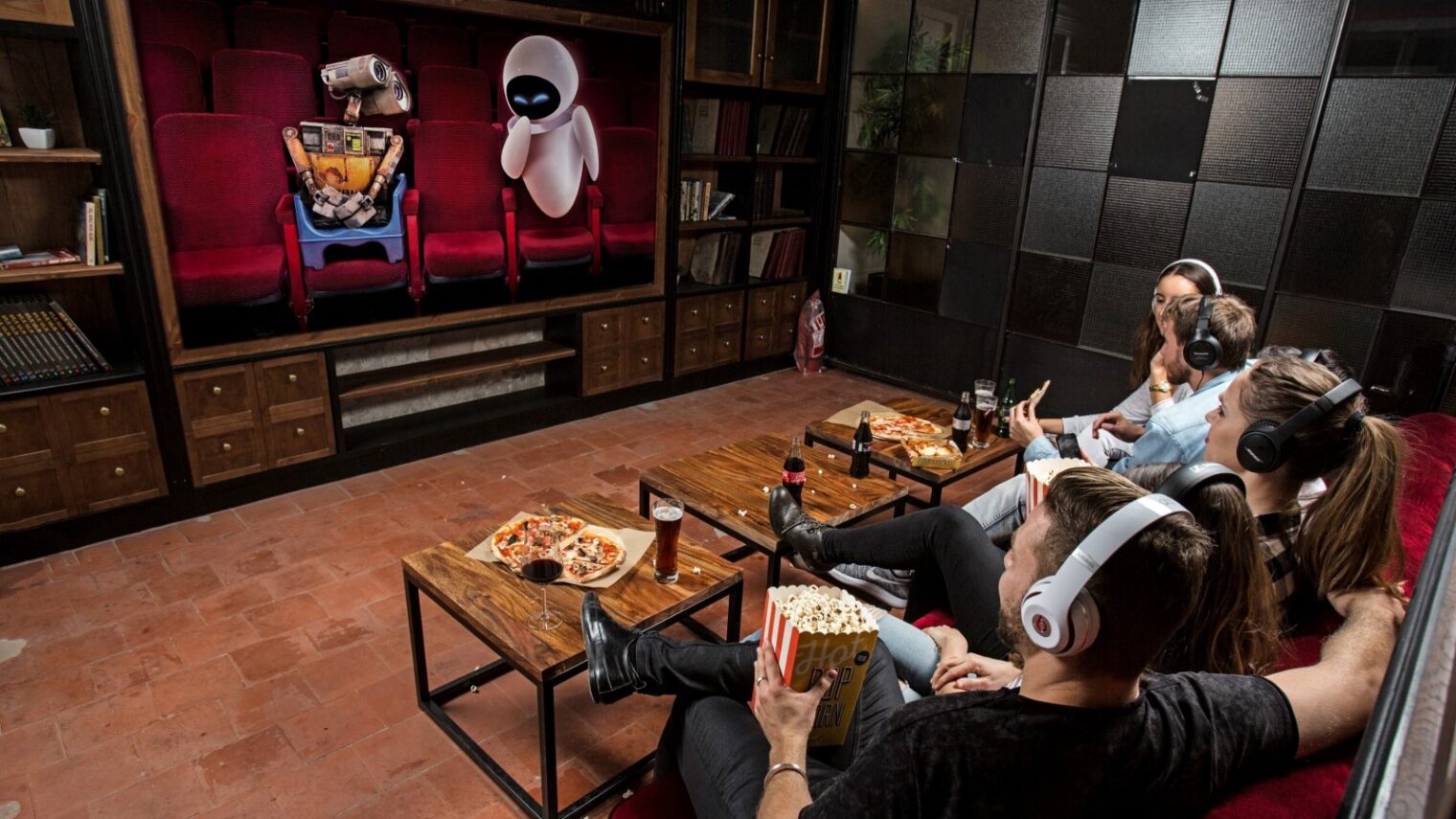The demise of the movie theater has been long predicted but has yet to come. The final nail in the coffin may be streaming services like Netflix and inexpensive 4K flat-screen monitors, which make staying in with a bucket of homemade popcorn a cost-effective and (for millennials who prefer to watch movies on personal devices) convenient alternative to the Cineplex.
Alon Nisim Cohen, a cinema buff and fan of the classic movie-theater concept, decided he wasn’t about to let a time-honored tradition become the latest casualty of the digital age.
Instead, he’d bring digital smarts to the theater.
The result is Muvix, a mashup of the comforts of home with the excitement of a night out on the town, all run by an intriguing mobile app.
While the Muvix Concept mini-multiplex at the Tahana – the old Tel Aviv train station in the fashionable Neve Tzedek neighborhood – looks and feels like a movie theater, what the company is really selling is a cloud-based technology for on-demand, multi-theater synchronized screening.
That’s a mouthful. So let’s start with a trip to the movies, Muvix-style.
Muvix has built 14 mini-theaters in a single open-plan building. Some accommodate just two people, others can hold a party of 20. Each room sports a large flat-screen TV and furniture designed to remind you of home. In one theater there’s a couch and a comfy armchair. Another has two large double beds.

To book a screening, you first download the Muvix app and choose the movie you’d like to see from a list of 100 or so recent and classic films. After passing through the old-timey lobby (with a chic bar and restaurant manned by chef Shahar Barnea of the upscale Tel Aviv bistro Café Noir), you are given a pair of Bose headphones to plug into your smartphone unless you prefer to use your own. The app tells you which theater you’ll be using and the Muvix software links the video with the soundtrack.
The core of Muvix’s technology is keeping track of hundreds of users watching potentially dozens of different films at once, with the soundtracks streaming over multiple cellular phone networks (or at the Muvix Concept space, via Wi-Fi).
You don your headphones and the movie starts at the appointed time. If you want to order food during the film, you can call a waiter from within the Muvix app – no need to get up and miss a crucial scene. Which is a good thing, since there’s no pause button.
The software supports pausing the film, Muvix CEO Nithai Barzam told ISRAEL21c, but it gets complicated. “If you’re a party of 10, who gets to control the pause? So after some testing, we decided not to include the functionality in the app.”
Indeed, Muvix Concept in Tel Aviv is really a beta testing facility for Muvix’s eventual move on the US market. So far, 5,000 people have seen a Muvix-powered film. The theater has been open to the public since July on weekends; the introductory fee is NIS 20 per person, including a free drink.
Muvix in the workplace?
While Muvix aims to create a fun alternative to watching at home, where Barzam and Cohen are going with the technology is not necessarily the movies. Barzam envisions Muvix software being used in corporate environments where a series of pop-up theaters could easily be rolled out for a night or two. The “movie” might be company-provided content about its new product line, or a team-bonding event.
Sticking with the Hollywood direction, a municipality could create a pop-up theater in the park, on a rooftop or at the beach with multiple screens. (The Tahana has been running free Movie Tuesdays all summer with three screens outdoors.) You pick your movie from the app, don your headphones and share the experience of being together while watching what you prefer. It looks a little like a headphone dance party – without the dancing.

Muvix could be implemented in a hospital waiting room, an airport waiting area, a live concert or a sporting event, Barzam suggests. All the controlling software is run from the cloud, so there’s nothing to install beyond the screens and projectors. Muvix provides a small set-top box that manages the communication with viewers’ phones.
The Muvix experience can seem a bit isolating at first because you’re ensconced in your private sound bubble. If you want to talk to your friends, a private group audio button lets you speak over the soundtrack to others in your group. Barzam says about 50 percent of Muvix beta testers have indicated they’d use such functionality.
Of course, the headphones also offer benefits, eliminating noise from chatty neighbors and allowing individuals watching the same film to choose soundtracks in different languages. Children at a Muvix-powered birthday party can choose to find Dori in English, Hebrew, Arabic or Russian.
Worried that your phone doesn’t have enough juice to last the entire film? Hit the call button on the app and a Muvix staffer will bring you a battery charger.

Muvix is currently small – just 15 people in nearby Petah Tikva, half of whom are software engineers – and has raised $6 million from several angels along with founder Cohen, who previously headed and took public CyberArk, one of Israel’s largest cybersecurity companies. Barzam says Muvix is now looking toward a Series B round.
Whether Muvix ends up prying millennials off their couches or making its mark in the high-tech conference scene remains to be seen. But in our test, the software worked, the sound always stayed in sync, and we didn’t even notice the group of rowdy teenagers making a ruckus in the theater space next door.
For more information, click here.














